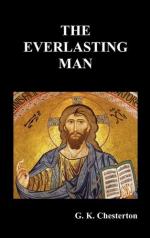
|
| Name: _________________________ | Period: ___________________ |
This test consists of 15 multiple choice questions and 5 short answer questions.
Multiple Choice Questions
1. What abyss in the unity of the absolute does Chesterton reference?
(a) The moment when God had been forsaken of God.
(b) Christ rising from the grave.
(c) The three Marys.
(d) None of these.
2. What two important elements from the past did the arrival of Christ unite, according to Chesterton?
(a) Faith and morality.
(b) The beliefs of the shepherds and the philosophers.
(c) God and man.
(d) Religion and exclusion.
3. What popular belief about the New Testament does Chesterton refute?
(a) That the scriptures need interpretation.
(b) That the books of the New Testament are contradictory.
(c) That Jesus was a merciful and humane lover of humanity.
(d) That Jesus was apolitical.
4. Who does Chesterton label as the most inspirational character from the story of the fall of Troy?
(a) Achilles.
(b) Helen.
(c) Hector.
(d) Paris.
5. What does Chesterton say God provided in the story of Jesus Christ?
(a) Guilt of sin.
(b) Martyrdom.
(c) The ultimate story.
(d) A model for redemption.
6. What does Chesterton say of society and the church during the rise of Christianity?
(a) One was dying and the other being born.
(b) They were dependent on each other.
(c) They were both complex and many sided.
(d) Society clung to the church like a parasite.
7. What does Chesterton argue is the case of Asian religions and Islam?
(a) They will fade out naturally.
(b) They are too removed from ethics.
(c) They are too far removed from politics.
(d) They leave out fundamental ideals.
8. What does Chesterton call the death of Socrates?
(a) An interruption in his teaching.
(b) Inconsequential.
(c) Symbolic of the time.
(d) Unavoidable.
9. Among whom does Chesterton assert that claims of divinity are common?
(a) Lunatics.
(b) Sages and prophets.
(c) Founders of religion.
(d) Mystics.
10. What does Chesterton state that mankind recognized from the very beginning?
(a) His role in the world.
(b) His own ineptitude.
(c) Purpose in existence.
(d) His power to alter the world.
11. What does Chesterton say was the reaction of the populace to the rising Christian movement?
(a) Despair.
(b) Jealousy.
(c) Hate.
(d) Fear.
12. What does Chesterton say is the one great startling statement uttered by man since he was able to make statements?
(a) The the world had a creator.
(b) God was all powerful.
(c) That the creator of the world visited his world in person.
(d) That he is unique.
13. What does Chesterton bring up as a strange part of the story of the New Testament?
(a) The trial and punishment.
(b) The missing 30 years in Jesus's life.
(c) The miracles.
(d) The references to the passing of time.
14. When morality and faith in the gods was crumbling in Rome, what else does Chesterton say was crumbling?
(a) Desire for violence.
(b) The hope for mankind.
(c) Curiosity.
(d) Intellectuality and philosophy.
15. Which of the following does Chesterton say Christendom brought to the world?
(a) Salvation.
(b) Order.
(c) Hope.
(d) Clarity.
Short Answer Questions
1. According to Chesterton, how was the purity of the Church preserved?
2. What does Chesterton say started to infect Rome and weaken her moral standing?
3. To the Romans, who were used to hearing about so many different sects and religions, what does Chesterton say was different when they heard about Christ?
4. According to Chesterton, what was Rome?
5. What does Chesterton call Islam?
|
This section contains 593 words (approx. 2 pages at 300 words per page) |

|




